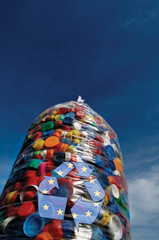New delivery programme
 agendaNi examines the addendum to the Waste Management Strategy, which outlines a new delivery programme focused on keeping waste out of landfill.
agendaNi examines the addendum to the Waste Management Strategy, which outlines a new delivery programme focused on keeping waste out of landfill.
The Northern Ireland Waste Management Strategy (2006-2020) is under review after the revised Waste Framework Directive (rWFD) was fully transposed in Northern Ireland in April under the Waste Regulations (Northern Ireland) 2011.
This Directive had set a target to recycle 50 per cent of household waste by 2020 as opposed to the strategy’s original target of 45 per cent. The addendum to the Waste Management Strategy proposes to increase the target for all municipal waste (household, construction and industrial) to 60 per cent by 2020.
The DoE is consulting on the addendum (until 20 October) which includes a revised delivery programme stating that preparation for a new strategy should get underway by 2012.
As well as complying with current EU legislation, reasons for the addendum include:
• the economic downturn (and the consequent impact on levels of waste, which will be unpredictable for a number of years);
• the fact that the Executive will be forced to focus on legislation rather than infrastructure until funding becomes available; and
• the UK and Scottish governments’ aims for ‘zero waste’.
In addition, future EU waste policy is likely to include more stringent requirements focused on interventions higher up the waste hierarchy e.g. prevention, preparing for re-use, and recycling.
Environment Minister Alex Attwood has said: “Re-focusing delivery of the waste programme on those areas where we can have the greatest impact is a significant step.”
It is suggested that a new recycling policy should be introduced including the introduction of ‘prepare for re-use’ (checking, cleaning or repairing waste products so they can be re-used without any other pre-processing) and recycling targets.
For construction, demolition and excavation waste, the addendum proposed that site waste management plans be legislated for by September 2011. Annual increases of 3.7 per cent in the reusing, recycling and recovery of construction and demolition waste between now and 2020 would see Northern Ireland meeting its 70 per cent target, the addendum claims. The department has delayed making the decision until after DEFRA’s review of its site waste management plans regulations.
A spokeswoman said: “DEFRA expects to have concluded its review by the end of this year. This means that if we proceed to making the Northern Ireland regulations it will be next year at the earliest with implementation of the regulations being rolled out after that.”
Separate collection of waste was also prioritised in the rWFD. Currently all district councils provide for the separate collection of paper, metal and glass, either by kerbside collection or through recycling banks. District councils also separately collect plastic bottles at kerbsides. The Waste Regulations stipulated that a new strategy must ensure that it will be an offence for private operators not to collect these four waste streams separately where technically, environmentally and economically practicable.
The EU Packaging Directive was transposed in the UK in 2007. Packaging and producer obligations now require businesses with a turnover of more than £2 million that handle more than 50 tonnes of packaging waste per annum to join a compliance scheme which takes on the businesses recovery and recycling obligations for a fee. Businesses with an annual turnover of less than £5 million can voluntarily follow an allocation method whereby their obligations are calculated on their turnover and the type of packaging handled. The addendum proposes that the following specific compliance targets be applied to the region:
• minimum collection rates for waste portable batteries of 25 per cent by September 2012 and 45 per cent by September 2016; and
• an overall packaging waste recycling rate of 68.1 per cent for obligated businesses by 2012.
Announcing the consultation in August, Attwood called for representations as to what more he needs to do: “This is not a consultation for the sake of it. It is to challenge me and to ensure that we can make rapid progress.”





